Tom's Guide Verdict
PIA is near the top when it comes to privacy, security and tracker blocking. While it doesn't really impress with speeds, it's packed with some unique features and powerful tools – not to mention its ability to unlock popular TV streaming services. Overall, it's a very capable and secure VPN that's well worth considering.
Pros
- +
Verified as zero logging
- +
Unrestricted torrenting
- +
Reliable kill switch
- +
Highly configurable
- +
Unlimited simultaneous connections
- +
Excellent for content unblocking
Cons
- -
Below average WireGuard speed
- -
Apps can be intimidating
- -
Apps are rarely updated
Why you can trust Tom's Guide
Founded in 2010 and considered a big player ever since, Private Internet Access (PIA) is a well established and trusted VPN provider. With possibly the largest number of individual servers in the industry – over 10,000 – and a proven zero-logging policy, on paper the Kape Technologies-owned outfit looks the business.
In my comprehensive, hands-on Private Internet Access review, I'll be digging through the marketing fluff and exploring PIA's performance, features, how it works for streaming and torrenting, and plenty more. I'll also be comparing how it matches up with the very best VPN services to help you make the most informed decision when it comes to your personal privacy.
If there's a particular feature you're interested in, use the navigation bar to skip ahead to your desired location. If you want to take in the full extent of my expert PIA review, simply keep scrolling – starting off with key stats and a condensed 2-minute review.
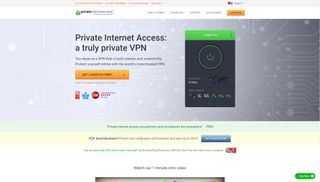
PIA on paper
| Number of servers | 10,000+ (including at least one in every US state) | Row 0 - Cell 2 |
| Server countries | 91 | Row 1 - Cell 2 |
| Supported platforms | Windows, Mac, iOS, Android, Linux, Chrome, Firefox, Opera | Row 2 - Cell 2 |
| Simultaneous connections | Unlimited | Row 3 - Cell 2 |
| Split tunneling | Yes | Row 4 - Cell 2 |
| Kill switch | Yes | Row 5 - Cell 2 |
| Protocols supported | OpenVPN, IKEv2, WireGuard | Row 6 - Cell 2 |
| Country of registration | USA | Row 7 - Cell 2 |
| Support | Live chat, email, knowledgebase | Row 8 - Cell 2 |
Private Internet Access 2-minute review
Private Internet Access is a very cheap VPN if you're willing to sign up for a lengthy plan. The best price is typically around $2.19 a month on the two-year plan, but regular VPN deals can drop this even lower. However, if you don't fancy signing up for years at a time, expect to pay more, with the monthly plan coming in at a hefty $11.99.
PIA has maintained a very respectable #4 in my rankings, coming in just under the top three providers, NordVPN, ExpressVPN, and Surfshark. This is down to excellent privacy features and tons of configurable functions and unique features.
One of PIA's best features is its torrenting ability. Not all VPNs are so P2P-friendly, and many don't deliver such reliable connections. Thankfully, PIA permits torrenting on any server, and the port-forwarding function is tailored to P2P sharers.
A neat addition to the PIA toolbox is the ‘piactl’ command line tool, which allows you write scripts for the app to follow – something quite unique in the consumer VPN market.
The no-logs policy is watertight. This has been confirmed through an audit by independent third party Deloitte, and two trips to court, in which the VPN had no information to share.
PIA also has excellent privacy and security credentials. You’ll get access to OpenVPN and WireGuard, and you’ll also be able to choose your level of encryption. All apps are open source, the kill switch was totally effective in my testing, and the no-logs policy is watertight. This has been confirmed through an audit by independent third party Deloitte, and two trips to court, in which the VPN had no information to share.
When it comes to unblocking streaming content, PIA has improved on last review's already impressive performance. It unblocked every streaming site I tried, including multiple Netflix locations, BBC iPlayer, Disney+, and even smaller sites like Australia's 10Play and 9Now.
One of PIA’s weaker areas is its support. Unfortunately, the written articles are a little sparse, but a positive is that a live chat feature was recently introduced, so that should cut query time down substantially.
Overall, if you’re after a secure, stable VPN, Private Internet Access is a very worthwhile option that’s also eminently affordable if you choose its two-year subscription plan.
Latest updates
- Passed second no-log independent audit
- Server network up from 84 to 91 countries across 152 locations worldwide
- Android app passed Google Mobile App Security Assessment (MASA)
- Small app tweaks and bug fixes (Android app now has the option to use your system DNS rather than PIAs)
- Simultaneous connections policy has been upgraded to allow unlimited usage, up from 10.
- Improved unblocking, with 10Play now being available.
- Bug bounty program
- Number of languages increased to 17Monthly plan has risen to $11.99
- WireGuard and OpenVPN speeds have dropped slightly, although mileage may vary between tests
PIA VPN price and payment
| Plan length | Overall cost | Monthly cost |
| 1 month | $11.99 | $11.99 |
| 6 months | $45.00 | $7.50 |
| 2 years | $56.94 | $2.19 |
Signing up for Private Internet Access on a monthly subscription isn't the best deal. At $11.99/month it's no cheap monthly VPN, though certainly not as high as some. You really get a good deal if you sign up for either PIA's 6-month or 2-year plan.
PIA's 6-monthly plan is $45 for the entire subscription period, which works out to $7.50 per month. This is a fairly decent deal, but you really save money on the 2-year plan. The longest plan is roughly $56 for the whole 2 years, which works out at $2.19/month. Included in that is an extra 2 months, which is a nice little extra. Plus, PIA often offers deals throughout the year that drop the price even further – we've seen it drop to just $2.03 a month in the past.
One notable perk is that PIA offers a dedicated PI service. This is an add-on that you choose during checkout and costs an additional $5/month, regardless of the subscription plan. This is a little cheaper than NordVPN, but CyberGhost's comparative offering is far cheaper at just $2.25.
Private Internet Access doesn't have a VPN free trial, but it does have a 30-day money-back guarantee. PIA supports a massive list of payment methods, from credit cards and gift cards to cryptocurrencies and bank transfers, so if you’re looking for a secure way to bag a bargain, PIA could be a great choice.
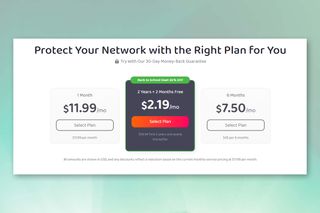
How private and secure is PIA?
Private Internet Access prides itself on its security services and includes several great features to ensure your privacy. And to help you feel 100 percent comfortable with its VPN, PIA has made all its apps open source, which means you can look over the code to see if there's anything fishy in there.
For users that aren't tech-savvy enough to understand source code, I've delved deep into the program and tested out its features to look for any leaks or possible compromises to its services. For example, I looked to make sure the PIA kill switch cuts off your internet connection immediately when your connection fails. And it does – on both desktop and mobile apps.
When you're connected, the VPN sends and receives encrypted online information. This makes it more difficult for your online history to be tagged as yours if it is intercepted. PIA uses AES-128 encryption as its default, but you can manually bump that up to AES-256, which is what military and financial institutions use – and we'd recommend doing so, just to be sure.
Another layer of security PIA uses are its own DNS servers. This helps reduce the chance of DNS data leaks. But you're not locked into this function. There is the option for you to change this to your own choice.
According to Deloitte, PIA manages its systems well and didn't find any reason to doubt its claims of its no-logging policy during its audits of PIA's VPN services.
Install the Chrome VPN extension and you’ll get additional privacy features, like the blocking of ads, trackers, and third-party cookies. You can use the extension to connect to the VPN from within your browser interface, but this only protects your browser traffic.
A nice feature in the Chrome extension is the bypass list, which allows you to selectively choose which websites will bypass the VPN and which will go through it. Again, PIA’s Chrome extension includes many configuration options, making it an excellent choice for VPN power users.
PIA’s website says that it absolutely doesn’t keep any logs of any kind, and goes on to claim how it’s ‘verified’ as a zero-logging service. PIA makes these claims on the back of its Transparency Report – you can read it yourself here. what's more, it's even been taken to court – twice – and has had nothing to hand over. That's a big green flag.
Like just about any VPN, PIA is regularly sent court orders, warrants, and subpoenas requesting information on its users, and the fact PIA has never handed anything over from one of these requests (because there’s nothing stored to hand over in the first place) effectively proves it does not log its users. That’s excellent news.
There's a bit of a wrinkle when it comes to PIA's open-source policy. Basically, it's a bit half-hearted. While most of the code is available, after the most recent update the open-source code wasn't updated because only 'minor' changes were made. That's hardly a deal-breaker, but we'd like to see more rigorous efforts to open-source everything the company does.
However, we get back on track, and the best news about PIA is that its privacy claims have been independently audited by Deloitte, a very credible and well-known management consulting company that specializes in security audits.
According to Deloitte, PIA manages its systems well and didn't find any reason to doubt its claims of its no-logging policy during its audits of the VPN services.
Overall, Private Internet Access offers excellent privacy, and if I'm honest, there are very few holes to pick at.
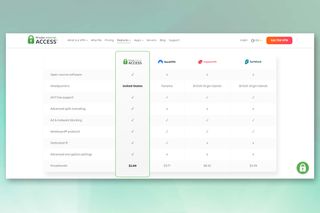
How fast is Private Internet Access?
| WireGuard | 330Mbps |
| OpenVPN | 270Mbps |
Great connections speeds are non-negotiable for many VPN users, and PIA is well up to task – despite its top results being significantly below average.
When I tested PIA, the average connection time was 2 seconds when using WireGuard and 2.5 seconds when using OpenVPN, regardless of where I was connecting to, including distant locations. This is very good in my book.
I tested PIA on systems in a UK data center and a US location, each with a 1Gbps connection. I used the app to connect to my nearest location, then measured download performance using several speed testing sites and services (SpeedTest's website and command line app, nPerf, SpeedOf.me, and more). I ran the tests using both WireGuard and OpenVPN connections, then did it all again in an evening session.
When using WireGuard, speeds topped out at around 330Mbps, slightly less than its previous top results (360Mpbs). That's still far faster than most domestic Wi-Fi connections, and won't affect anything like streaming in HD.
OpenVPN speeds dropped a little, clocking in at 270Mbps from 310Mbps.
However, it's worth noting that a number of providers like Surfshark, NordVPN and IPVanish maxed out our superfast line, delivering speeds of over 950Mbps. If speed is a priority and you have the setup to use gigabit speeds, PIA may well slow you down. However, if you're working with a regular connection, it's fast enough by far.
How good is PIA for streaming?
| Netflix | Working (US, UK, AU, CA, JP) |
| Prime | Working |
| YouTube | Working |
| iPlayer | Working |
| Disney Plus | Working |
| 10Play | Working |
| 9Now | Working |
| Hulu | Working |
| ITV Player | Working |
| All4 | Working |
Ever tried to look something up only to get a 'not available in your region' message? Private Internet Access can help with that. When connected to a server in the right location you can access all kinds of geo-blocked websites. That includes TV streaming websites.
I tried accessing the most popular streaming services using PIA, and it didn't disappoint. In fact, it did well enough to be included on the list of the top Netflix VPN services. I was able to watch Netflix libraries from the US, UK, Canada, Australia, and even Japan. Other services PIA unblocks are BBC iPlayer, Amazon Prime, and Disney Plus.
In an improvement over my last round of testing, PIA can now unblock the Australian service 10Play – making it one of the very few providers that unblocked absolutely everything I put in front of it.
This now makes Private Internet Access a very viable streaming VPN, right up there with ExpressVPN, Surfshark, and NordVPN.
How good is PIA for torrenting?
Torrenting is a method of sharing files with multiple people at once, though it can also be used for a single person-to-person (P2P) transfer, too. Regardless of who you're sending data to, Private Internet Access protects it so it isn't intercepted or traced back to the device you sent it from. This is done, in part, by encrypting the data.
One reason Private Internet Access is an excellent torrenting VPN is that it doesn't support just a few servers. You can use any location for your torrenting activities, without any limits or restrictions.
Regardless of who you're sending data to, Private Internet Access protects it so it isn't intercepted or traced back to the device you sent it from.
PIA also offers a port forwarding function. This lets incoming connections bypass the NAT firewall, which quickens download speeds – but this does put you at more of a risk. I’d only recommend using it if you already know what you’re doing, and have a good grasp on what it does and doesn’t allow you to do.
Also, it’s worth noting that while PIA offers these features, there’s not much in the way of support on the website. Users are essentially given the tools and left to their own devices. This is quite understandable given the grey area that P2P sharing is, and most other providers do the same.
Otherwise, PIA is very capable for torrenting and has more dedicated P2P tools than most rivals. It’s certainly worth considering if you’re something of an expert and think you could get the most out of what’s on offer without any hand-holding.
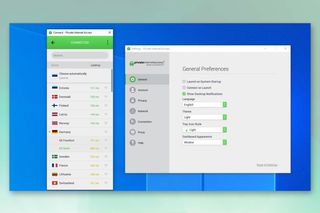
How good are Private Internet Access's desktop apps?
Private Internet Access makes it super easy to get started. On its website, it's clear where to find all the VPN services with links to the supported platforms. For desktops, you have the option to install PIA on Windows, Macs, and Linux machines. Browser extensions are also available for Chrome, Firefox, and Opera.
On that note, PIA is one of the very best Linux VPNs, offering tons of configuration alongside a GUI.
You're also not limited to a single device. In fact, in a very welcome move we wish more providers would consider, PIA now has unlimited simultaneous connections – up from 10 in my last review. This puts it on a par with Surfshark and IPVanish.
Installing PIA is straightforward. The download pages for each VPN client include a detailed changelog that shows you which changes have been made to the product over time, and old versions are available to download if an update isn’t performing well. If you want to use your own client, OpenVPN configuration files are available, which is a nice touch.
Once you’ve installed the PIA desktop app and logged in, there’s a big Connect button that automatically connects you to the closest server. You can easily choose a VPN server from the list of countries and cities, with most showing you ping times so you can get an idea of expected latency.
PIA lets you connect up to 10 different devices to its VPN at the same time.
Digging into the settings you’ll find a very configurable VPN. You can choose OpenVPN over WireGuard or UDP over TCP. You can set a custom port, and choose an encryption level (AES-128, AES-256), although authentication and handshake configuration has been removed to stabilize the app’s performance and improve speeds. This is no huge loss, but it is important to note.
It’s simple to find the server list, which lists country, city, and ping times. You can sort servers by name or ping, and there’s an effective search function as well as a favorites system which definitely improves usability.
The PIA desktop client includes a kill switch that disables internet access if your VPN disconnects for any reason. In my testing, this performed admirably, always notifying me of an internet connection issue and reconnecting without once exposing my real IP address.
There’s a command-line client called ‘piactl’. This means you can administer the VPN through the use of a script. For example, you can set your VPN to enable and disable at certain times of the day. There isn't a lot of information on this feature, but with the right amount of tinkering, you could have your VPN performing relatively intricate automated functions.
Personally, I love having all of this at my fingertips, but beginners or users that want a simple, lightweight experience may well find the plethora of options a little overwhelming. However, this is a minor concern, as while there's tons of stuff you could do, most of it is neatly tucked away – especially when you're using the mobile apps. Speaking of which...
How good are PIA's mobile apps?
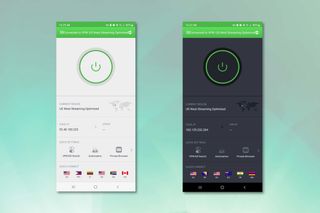
PIA has mobile VPN apps for iPhone and Android, and both are packed with great features and can be configured to your specific privacy needs. Both have an automatic kill switch, WireGuard and OpenVPN connection options, and custom ports. The apps look very similar to the desktop versions, so if you're using PIA on multiple devices it will feel familiar.
When you open the Android VPN, you’ll see a very simple interface - with white space, a big On/Off button, and the usual stuff, like the IP address and location you chose. However, if you swipe up you’ll see plenty of other icons, buttons, and status details.
Tapping the region brings up a list of the other available regions, with a guide on expected latency, so you can choose wisely. It’s worth noting that these settings screens are a little busy, and there’s a lot of info to take in. That doesn’t affect usability though, and also means everything you need is very easy to get to, and not hidden behind multiple menus.
PIA’s mobile apps – both Android and iOS – are real highlights of the provider's suite of software.
The PIA iPhone VPN app is very similar in looks and functionality to its Android counterpart. You'll get that stylish interface, an intuitive location picker that shows server latencies, and of course the Favorites system. Also, there are plenty of customization options to make the console look the way you want it to.
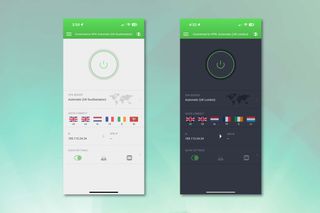
A Network Management tile adds the ability to set certain networks as automatically trusted or untrusted. You could use this to automatically enable your VPN when you’re at a coffee shop and disable it when you get home, for example. There’s support for Siri shortcuts too, so you can enable and disable your VPN with a voice command. Aesthetically, the iOS app is a little tidier than the Android version and doesn’t sacrifice a whole lot in the process.
One advantage the Android app has over the iOS version is split tunneling. This lets you choose which apps use the VPN rather than shielding the entire device. Split tunneling is a good way to increase speeds and save on data. but since PIA doesn't have data limits, this isn't a huge loss – and almost no other VPNs offer split tunneling on iPhone either, due to limitations in iOS.
Overall, PIA’s mobile apps – both Android and iOS – are real highlights of the provider's suite of software, and if you’re a mobile-first user, PIA is definitely worth considering.
How good is Private Internet Access support?
There are a few support options if you need any help with Private Internet Access's clients. Your first place to look for some quick answers is in the web knowledgebase. This has articles about account problems, general troubleshooting, and common technical issues.
PIA's articles aren't the most detailed, especially compared to ExpressVPN or NordVPN knowledgebases, but they are helpful. And it could be quicker than reaching out for one-on-one help.
For human help, you have two options, raise a support ticket or try the new live chat feature. During testing, I typically received replies to support tickets within five hours, which is lengthy compared to some other VPN services.
PIA has also recently introduced a live chat feature, catching up with much of the competition. When I tried it out, the agent I spoke to was fairly knowledgeable and offered useful, actionable advice about the issue. Good stuff, then.
Private Internet Access review: Final verdict
Private Internet Access definitely lives up to its name as one of best privacy-focused VPNs on the market. Its apps offer a ton of configuration, and experts and beginners alike should get on well with it. Those looking for a simple experience, however, may be better off with a more streamlined service.
Connections speeds are nothing to write home about, but will be more than adequate for almost every user, and streaming support is up with the very best. One of the biggest draws, however, is the price. Although it doesn't feel it in use, PIA is one of the cheapest providers around, and if you fancy signing up for 2 years, it's almost unbeatable in terms of value.
Overall, PIA is well worth considering, and is a very viable alternative to big names such as ExpressVPN and NordVPN.
Tom's Guide rating: ⭐⭐⭐⭐½
Subscribe if:
✔️ You're a Linux user. PIA is an excellent VPN for Linux users, and is one of the few providers to offer a native GUI (Surfshark being another).
✔️ You want proof of a no-logs policy. PIA has had its claim of no logging proven in court twice. That's just about as reliable proof as you're going to get.
✔️ You want a server in every US state. This is perfect for getting around things like sporting blackouts and shopping restrictions, or doing research on medical procedures banned in your state.
Don't subscribe if:
❌ You prioritize connection speed. With peak speeds of around 330Mbps in our testing, PIA certainly isn't slow – but there are much faster out there.
❌ You value simplicity. PIA definitely presents as more of an 'expert' option, meaning that newbies could be intimidated by the additional functionality and settings.
| Feature | Comments | Rating |
|---|---|---|
| Design | Loads of customization options, can be a bit overwhelming | ⭐⭐⭐ |
| Ease of use | Great for tech-savvy users, not too beginner-friendly | ⭐⭐⭐ |
| Performance | Decent speeds but falls behind the industry heavyweights like NordVPN and Surfshark | ⭐⭐⭐ |
| Unblocking | 20,000+ servers in 91 countries for smooth and fast content unblocking | ⭐⭐⭐⭐ |
| Security and privacy | Best-in-class encryption with a proven no-log policy | ⭐⭐⭐⭐⭐ |
| Customer support | Adequate resources, plenty of guides, and a contact form to reach the team | ⭐⭐⭐⭐ |
| Price | One of the cheapest VPNs, all the more ideal for the long term. | ⭐⭐⭐⭐⭐ |
How we test VPNs
Understanding how our team of experts tests VPNs is important. It lets you know that we really have got hands-on with these products, and that we’ve considered every feature, no matter how small. Some sites just give a rundown of specs found on a provider’s website – we endeavor to do quite a bit more than that.
First of all, we do check the provider websites, and note useful information like the number of servers and locations, whether you’re allowed to use every server for P2P, which encryption protocols are supported, the variety of operating systems it runs on, and tons more. We also check the pricing at this stage.
This initial scan gives us a baseline understanding of the service, and if there are any bold claims on-site we note them to make sure the customer isn’t being misled.
We’ll then dig into privacy policies. This is a very important piece of literature for any company, but for VPNs they need to be absolutely watertight. We’ll also go through the logging or zero-logging policy to look for gaps, and read any information available on independent audits.
Then it comes to testing the applications themselves. We test how easy it is to download and install, noting if any data collection options are clearly outlined to the user. We then inspect the default configuration to see what you have to ‘opt in’ for, and what features are available overall. We then play around with any additional features, such as ExpressVPN’s server speed test or NordVPN’s Double VPN. After we’ve gone through everything on the surface, the fun bit starts – trying to break things.
We throw all sorts of curveballs at these VPNs, like connecting to oddly configured networks, and killing processes to see if we can get the VPN to stop without activating the kill switch.
After we’ve had our fun, we check in with the support team to see if they’re helpful. Then, we’ll check a wide range of streaming sites to see if the VPN is able to access geo-blocked content, and we’ll run a series of speed tests over a few days and nights to get an accurate picture of what sort of connection speeds you can expect.


Mo is VPN Editor at Tom's Guide. Day-to-day he oversees VPN, privacy, and cybersecurity content, and also undertakes independent testing of VPN services to ensure his recommendations are accurate and up to date. When he's not getting stuck into the nitty-gritty settings of a VPN you've never heard of, you'll find him working on his Peugeot 205 GTi or watching Peep Show instead of finally putting up those shelves.
-
episani I had a yearly subscription and by mistake they sent me an offer to reactivate that subscription which wasn't expired. I clicked and paid into the offer, which was for a 2 year subscription, but it created a new subscription instead of extending the existing one. I ended up with 2 subscriptions. I was expecting the subscriptions to be merged. When I received an email saying that my subscription was expiring it took me by surprise. When I contacted customer service they said I should have merged the subscriptions within 30 days of receiving the second subscription. They basically stole 7 months of subscription from me. Customer service is horrible and you can't access a history of financial dealings in your account. Please keep your emails as it is the only proof you have of any charges made by this company. Very dodgy. Please avoid.Reply -
rayh99 Been with PIA since 2010 and own multiple accounts that I pay with Gift cards. PIA stole $50 from me and have refused to restore or refund the funds even after providing them with statements showing that the payment was legit.Reply
Private Internet Access charged me $50 for a year account. A few days later they close my account and have refused to refund me the money or reinstated the account. The excuse they gave was that a transaction had show on the card that I paid with after purchasing the year service.
Even after I show a statement of the gift card that the PIA payment was the only one on the gift card pia refuses to refund or restore the account or refund the money.
I have heard multiple you tubers knocking them down since they got bought over but I actually never tough they will steal $50 and refuse to make things right. STAY AWAY FROM THIS VPN, THEY SCAMMED ME AND WILL DO YOU AS WELL. -
Cerelia I had the absolute worst experience with this company and would never use them nor recommend then again. I had a static IP address I paid for each month and it suddenly stopped working. I used the token I was given to try and reactivate it and received the error "incorrect token." I have numerous financial accounts linked to this IP address for access and was temporarily unable to access them.Reply
When I tried to resolve this with PIA, their chat support was absolutely abysmal . After explaining the issue, the person had no idea what the issue was and disappeared from the chat so long that it disconnected. When I tried to reinitiate the chat, it was busy for 2 hours. Finally I got through to the "same person" who acted like they had no idea who I was or what my issue was (amnesia?). They offered a refund with no explanation of why my static IP address stopped working.
Email support was even worse. It was like talking to machines who don't read or understand tickets. How can anyone use a company that offers static IPs then randomly has them stop working...... Absolutely terrible all around. -
3ch Deceitful. Servers in 50 states either is false, or is irrelevant for the user.Reply
Fifteen US servers are listed in the UI, TWELVE of which are recognizable by a state name or a city name.
Disingenuous in replies to my complaints about the reduction in number from
the former far from 50
to the current 12. -
New User 101 I wonder if the reviewer Mo Harber-Lamond, ever actually used the PIA VPN, or did he just read about it somewhere else? If he had used it, even once, he would know that PIA is blocked by Google and a vast number of websites. It is almost impossible to run a basic anonymous search using google, without running against an almost infinite number of CAPTCHA tests.Reply
I suppose it is possible to avoid the test by logging into Google but users with any sense of personal security are outraged by the prospect of Goggle using your search terms to create a marketing profile. As far as I know, PIA never refreshes it's IP address ranges, so once the address is logged by the Google server, it is almost impossible to avoid being tracked. All the other search engines, DDG, Bing, Yahoo, Yandex, etc, are rubbish.
When my PIA contract expires, I will not be renewing and will apply other methods to search the internet, quietly. -
keepitsimpleengineer I recommended this to my brother who travels a lot. He could not get into his account to set it up. I advised him to cancel his credit card payment, Seemingly VPN company competition to drive down prices has resulted in terrible customer support, which is a shame.Reply
Most Popular


